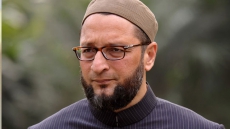A delegation representing the Indian film and entertainment industry met Prime Minister Narendra Modi here on Monday, and pitched for lower and uniform rates of GST for the fraternity.
Actors Akshay Kumar and Ajay Devgn, filmmakers Karan Johar and Rakesh Roshan, Censor Board chief Prasoon Joshi and Producers Guild of India President Siddharth Roy Kapur were a part of the delegation that met Modi.
According to a PIB statement, the delegation gave Modi an overview of the vast growth potential of the media and entertainment industry in India, and said that this sector is poised to contribute in a significant way towards the Prime Minister's vision for making India a five trillion dollar economy in the near future.
The film fraternity members even pitched for lower, and uniform rates of GST, for the entertainment industry in India, apart from calling for the development of Mumbai as the global entertainment capital, through various initiatives and proactive approaches.
Modi said the Indian entertainment industry enjoys immense popularity across the world. It is one of the key elements of India's rising soft power status, globally, he added.
A delegation representing the film and entertainment industry, called on Prime Minister Narendra Modi, in Mumbai today. The delegation comprised producers and CEOs of companies in the entertainment industry.👍🙏@vivekagnihotri @AnupamPKher @SirPareshRawal pic.twitter.com/IuJXyvh5Br
— Adarsh Hegde (@adarshdgp) December 18, 2018
He assured the delegation that the Union Government is supportive of the media and entertainment industry, and would consider the suggestions positively.
This is the second such meeting in the year after a delegation met Modi in Delhi in October.
Kapur, who was a part of the past meeting, had told IANS in a recent conversation: "The main agenda to discuss with the PM was what the entertainment industry in India can contribute as a soft power of the nation around the world and how it would be wonderful if the government could encourage this industry in very tangible ways to be able to grow and thrive."
He said issues like low screen density in the country need to be taken care of.
"We are a very underscreened country. The taxation levels in the country are extremely high (they are in the top bracket when it comes to GST), there is double taxation on the film industry because the local bodies have a right to impose their own tax on the industry. So, if all these impediments to the growth of the film and TV industry can be removed, we see a boom in the quality of content being created and in the reach of that content and in our ability for us to take the India story around the world.
"The PM was very open and forthcoming. He did say he believed that this was the case. So, we are very hopeful about this," Kapur had told IANS on the sidelines of the International Film Festival of India last month.



